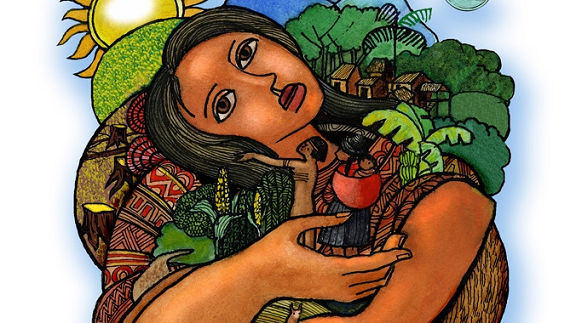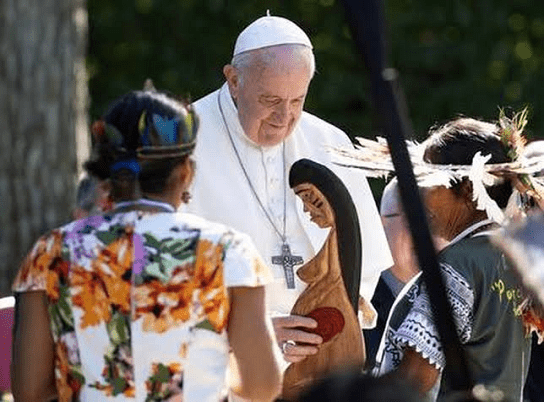The Ecclesial Assembly of Latin America and the Caribbean celebrated its first anniversary and on October 31, Pope Francis was presented with the text Towards a Synodal Church going out to the peripheries that arose from this process of community listening, dialogue and discernment
This December 2, the continental meetings ended with the analysis of the Ecological Dimension, recalling that in different spaces of the Ecclesial Assembly, particular interest was expressed in the commitment of Christians with the care of the common home
The continental meetings were directed to the people of God with the purpose of promoting the appropriation of the text of the Ecclesial Assembly and analyzing the proposed lines of action that imply the commitment of all the believers of the continent.
The continental meetings were directed to the people of God with the purpose of promoting the appropriation of the text of the Ecclesial Assembly and analyzing the proposed lines of action that imply the commitment of all the believers of the continent.
The Ecclesial Assembly of Latin America and the Caribbean celebrated its first anniversary and on October 31 the text was presented to Pope Francis Towards a synodal Church reaching out to the peripheries that arose from this process of listening, dialogue and community discernment, which motivated the organization of a cycle of continental meetings directed to the people of God with the purpose of promote the appropriation of its content Y analyze the proposed lines of action that imply the commitment of all the believers of the continent.
This December 2, the continental meetings ended with the analysis of the ecological dimension, recalling that in different spaces of the Ecclesial Assembly, particular interest was expressed in the commitment of Christians to the care of the common home, as read in the paragraph 373 of the text; as well as the need to work creating awareness about the implications of the problem, understanding that its defense is an expression of coherence in the exercise of faith and that from the actions it is possible to expand the incidence or impact in favor of caring for the environment ambient.
On this occasion, the meeting featured the participation of Monsignor Jorge Lozano, the deacon Alirio Cáceres and the young Paola Balanza that from prayer, reflection and testimony, enriched the moment and raised the challenges that the text proposes to us from the reflections made before, during and after the Ecclesial Assembly of Latin America and the Caribbean.
Pray, reflect, bear witness
“The creation groans as in travail and suffers from the corruption to which it has been subjected,” was the fragment of the Apostle Paul’s letter to the Romans that underlined Monsignor Jorge Lozano, Secretary General of Celamwhen opening the agenda with a prayer in which he recalled the invitation made permanently by Pope Francis to listen to the cry of the poor and of the earth, for which he advocated through prayer to place the desire in God’s hands to work for a common home that can be preserved and so that the pastoral orientations of the text of the Ecclesial Assembly serve to illuminate this process of reflection and action.
In this sense, Alirio Cáceres Aguirre, permanent deacon of the Archdiocese of Bogotá guided the reflection on the ecological dimension from his experience as ecotheologist; with the aim of motivating reading, appropriation and the need to bring to life the guidelines of the Ecclesial Assemblyunderstanding that this dimension is not alien to the others that he proposes, for which reason he invited to approach the text from the understanding of the cries of the people of God in the Ecclesial Assembly that are not other than expressions of the realities that they live, the signs of the times and the latent signs in the territory, aware that missionary discipleship implies being custodians of creation, that is, caretakers of the Common Home.
Bringing to mind some fragments of the encyclical Laudato Yes’, The expert recalled that “Assuming the experience of God implies coherence in daily life and having an impact on the structures is a permanent task. Thus, this ecological dimension unites us with humanity and with all beings who are the fruit of the overflowing love of the precious community of infinite love,” as Pope Francis defines the Holy Trinity in several of the documents that are part of his magisterium.

A cross dimension
to understand what is the emphasis that the Assembly makesthe ecotheologist searched for the key words within the text, including terms such as integral ecology, common house, environment, Laudato, climate, water, territory, indigenous, native and Afro; terms present in 146 pages and 383 numerals, What we can associate with the concerns of the People of God and the clear application of the interconnection between all dimensions, these are not different proposals. He then assured that this is one of the main challenges, it consists of “connecting the plurality of ecological actions with the ethnic and social diversity that this dimension proposes.”
Although the text in rich in his diagnosis of the realities and pastoral deficiencies of Latin America and the Caribbeanthe deacon insisted on the need to connect all the dimensions, avoiding their reduction to ecological practices, so that the text can be applied to life in terms of evangelization, being sensitive to the needs and thoughts of young people and peoples, especially the Afro and original; because from the faith it is necessary to go beyond environmental practices to ensure that the application of the principles of ecology have a truly integral character.
And this – he considers – is one of the greatest contributions of the Church, to talk about integral ecology, move from the good intention of caring for the environment to caring for the whole family that has been created by God, that is, the common home and those who inhabit it. Thus he recalled the importance of understanding concepts such as territoriality and in it the birth of ecclesial and territorial networks at the service of this culture of care beyond the confessional.

Willing to get entangled
In this regard, he highlighted the work of networks such as the Pan-Amazonian Ecclesial Network (REPAM), the Mesoamerican Ecclesial Ecological Network (REMAM) and the newly formed Ecclesial Network Gran Chaco and Guarani Aquifer (REGCHAG) whose works raise a concern for the so-called 9 planetary limits, referred to beyond climate change and oriented to problems such as access and conservation of freshwater sources, care of the oceans and the need to reduce carbon footprintall with scientific elements that are part of those reasons to work on the challenges and pastoral actions proposed by the text of the Ecclesial Assembly.
For the ecotheologist we are “entangled” which means that by establishing links between people with the common interest of respecting the planet and favoring its conservation, we are contributing to the experience of synodality This calls us to strengthen inter-institutional work and assume those dreams raised by Pope Francis in Dear Amazon beyond this territory, they are actually dreams for the entire planet, one of the first steps is to assume a simple, sober lifestyle and without losing sight of the goal of form communities of care at the service and conservation of the Common Homeas invited by this dimension present in the pastoral actions proposed from the Ecclesial Assembly.

